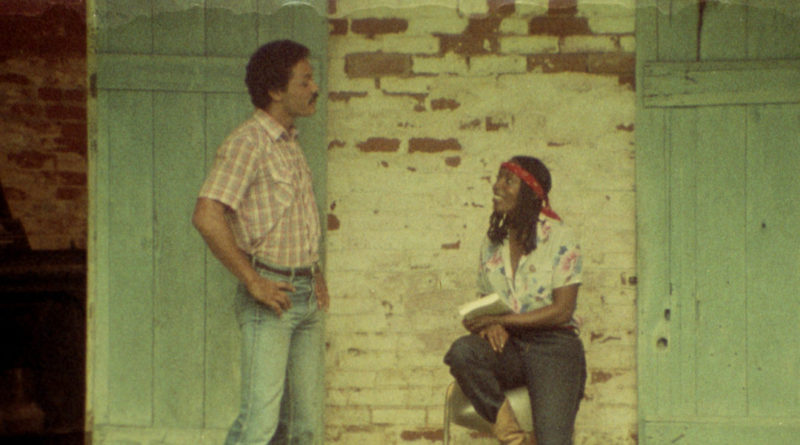REVIEW: ‘Cane River’
Photo: Cane River stars Richard Romain and Tommye Myrick. Photo courtesy of Oscilloscope / Provided by press site.
Cane River, made in the early 1980s by filmmaker Horace B. Jenkins, has been recently restored by IndieCollect, offering modern-day audiences the chance to experience a truly remarkable film about an intimate relationship and how it navigates many societal and familial pressures. At its heart, Cane River is a story about race, romance, being young and the history one brings to a new relationship.
Peter (Richard Romain) is a former football star who returns to his hometown of rural Louisiana. He is so beloved by his old community that they crowd around the bus as he steps off, like a celebrity deciding to pay homage to the place that formed him. As he settles in with family and friends, Peter decides to pass the time and head to a local historical site, where he meets Maria (Tommye Myrick), who is volunteering as a tour guide.
Peter quickly learns that Maria has plans to start her college career in New Orleans, and in these last days before she leaves, they decide to go on a date and have some fun.
The two are almost immediately taken by each other, and they begin a budding relationship. But there are complications along the way. Although they are seemingly in love with each other, and it doesn’t take Peter that long to start talking about marriage, they come from different backgrounds — with parents who disapprove of their plans for the future.
This is where the important social and historical layers of the movie factor in. Maria’s family doesn’t approve of Peter because of his Creole background, and Peter’s father, a local farmer, similarly has reservations.. Maria’s mother points out that Peter’s relatives are not like her relatives. They are both black, but Peter comes from a Roman Catholic background, while Maria is Baptist. Peter’s relatives also owned slaves at one point, and that history has been kept in the back of everyone’s minds, causing resentment between these two sides of the local parish. These differing histories are a problem for Maria’s mother and sometimes even for Maria herself. But the young couple overcome the odds and learn about the many complicated histories of the local area. There’s even one scene that finds Maria attending a Catholic Mass, and Peter heading to a Baptist service — education and acceptance win out amongst these new partners in life.
They take long walks and longer horse rides. Peter writes poetry, while Maria talks about how excited she is to start college. They even take a trip to New Orleans, where Peter meets with an attorney to settle a land dispute, and they head through the wonderfully evocative French Quarter and take in the sights.
Jenkins, who died shortly after the movie’s production, had an expert hand as both writer and director. He is able to touch upon important social issues of race, class and religion, but the film never feels like a message movie. Peter and Maria are well-though-out creations who are unique and interesting, from beginning to end, and their characters inform the overall thesis, rather than the other way around.
The main actors struggle sometimes with the more intimate scenes, and a few lines can come off as cheesy — almost like the romance is forced or driven by what’s written on the page, rather than what’s written on their hearts. Still, the actors seem to settle into their roles, and by the time their characters travel around New Orleans, they are more sure of themselves, even if they’re not sure where the relationship is headed.
Rural Louisiana is lensed beautifully throughout the film, but the real cinematographic joys come from those old images of New Orleans. There are some wonderfully grainy shots of the Superdome, the Quarter, Jackson Square and the Mississippi River. There’s style and personality dripping from many frames in the film, and that makes Cane River an important historical document.
The movie was believed have to been lost for several decades, but it recently turned up thanks to the Academy Film Archive from the DuArt Film & Video Vault. Thankfully they sought out the restoration help of IndieCollect, and this lost masterpiece — featuring a black director and all-black cast — has now found an audience. The story of Peter and Maria is important to experience, teaching many lessons about the intersections of society, race, history, religion and love.
By John Soltes / Publisher / John@HollywoodSoapbox.com
Cane River (1982). Written and directed by Horace B. Jenkins. Starring Richard Romain and Tommye Myrick. Running time: 104 minutes. Rating: 




